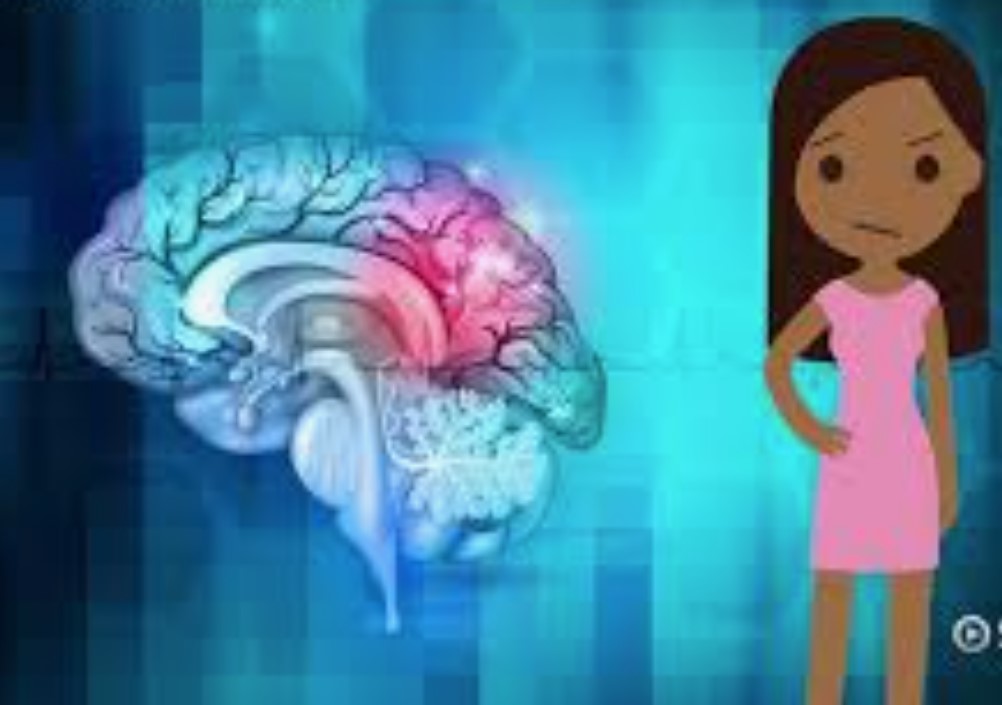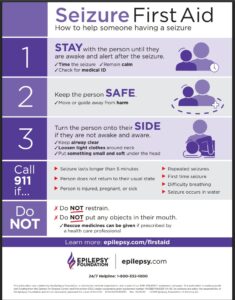
Epilepsy is an extremely common neurological disorder that is characterized by having seizures – 1 in 26 people will be diagnosed with epilepsy in their lifetime, and 1 in 100 people in the US have experienced a seizure or received the diagnosis.1 Among people with HIV, the chance of having a seizure in your lifetime is even higher (1 in 10).2 One important thing to know is that you can develop epilepsy at any point in your life, and people over the age of 55 are one of the groups who more commonly receive the diagnosis.1 This means that it is SO important for HOCC women to be aware of epilepsy, what it means to have a seizure, and what you can do if you are with someone who has one.
What is a seizure, and what is epilepsy?
A seizure is something that occurs because your brain is sending sudden, abnormal, and excessive amounts of signals all at once, and it can affect how you move and act.3 For the person having the seizure, they may be aware or conscious of what is happening (or not), say things that they don’t mean to say (or not), experience movements that they are not trying to make (or not), or experience smells and sounds that aren’t there (or not).3 There are some things that we know can provoke a seizure, and these include an injury/trauma to the brain, an infection of the brain, or either intoxication or withdrawal from alcohol or another drug.4 Just because you have had a seizure, however, does not necessarily mean that you have epilepsy. Epilepsy is a specifically defined condition where you have seizures that are not provoked and that either have occurred multiple times or are likely to occur multiple times.4
When do I talk to my doctor?
If you suspect that you have had a seizure or people have told you that you have, it is important to contact your doctor so that they can help you get to the bottom of it and refer you to a neurologist if it is likely that what happened was a seizure. When you go to the doctor, it is really helpful to bring with you the person who witnessed the event so they can explain what they saw and support you during the appointment.5 Your doctor might ask you to do some tests to help determine if what is going on is epilepsy, and may prescribe a new medication for you to help reduce the likelihood of having another seizure if it is. If you are living with HIV, it is extremely important that your neurologist knows this and can make sure that the medication they prescribe for you does not interact with your HIV medication.6 It’s important for you to know that people CAN manage their epilepsy with support from their healthcare team and have jobs, go to school, have families, and live happy lives, just like HIV.7 (If you have urgent questions to ask before you can get to the doctor, you can call the 24/7 Epilepsy Hotline at 1-800-332-1000 for English-language specialists, or 1-866-748-8008 for Spanish-language specialists).
What do I do if I am with someone that has a seizure?
As scary as it is to have a seizure, sometimes it can be just as scary or more so to be with someone that is having one. It is important to know what a seizure might look like so you can recognize it and know what you can do about it and some things that you should not do. Since the brain is so complex and does so many things, a seizure can look differently depending on what part(s) of the brain are involved. Some of the signs that you could see that could be distressing include seeing someone falling to the floor and making jerky movements or losing control of their bladder or bowels.8 Seizure First Aid includes STAY, SAFE, and SIDE. STAY with the person and start timing the seizure. Keep the person SAFE including moving away or encouraging them to move away from harmful or sharp objects. Turn the person onto their SIDE if they are not awake and aware, to make sure they are able to breathe without obstruction.9
You can get trained in “Seizure First Aid” for free at a live online training through the Epilepsy Foundation, which will teach you concrete steps to take to protect the person having the seizure, and important things like when to call 911 (sign up here https://www.epilepsy.com/recognition/first-aid-resources for any of the 5 English OR Spanish-language trainings being held from now until mid-June).
What can I do to manage my emotions around epilepsy if I am diagnosed, and figure out what lifestyle changes I need to make?
Having a seizure or receiving an epilepsy diagnosis can be very emotional. Different cultures have different perceptions of epilepsy that can be challenging to deal with, and you may feel confused, upset, or like you are not in control. These are all normal feelings to have, and you should not feel ashamed about them or having a seizure. To help manage these feelings, figure out what to do next, and make sure to make any adjustments to your day-to-day life to keep you safe and healthy, reach out to an Epilepsy Resource Room at a local hospital on this list: https://epilepsynewengland.org/programs/resource-rooms. A resource specialist local to Massachusetts can help you navigate resources available to you and how to access them, including education, support groups, and services.
If you are living with epilepsy or have a loved one who is, check out the Epilepsy Foundation’s eJourney page, where more than 250 people with epilepsy have shared their stories. You can even send in your own story so that others can learn from your experience, challenges, and successes while living a full life with epilepsy. https://www.epilepsy.com/stories/ejourney

